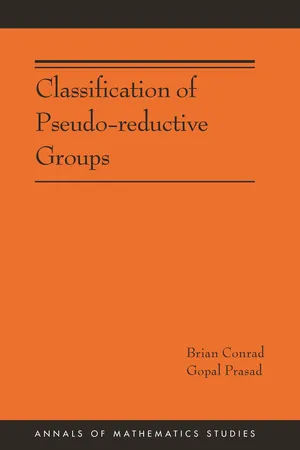
- 256 pages
- English
- ePUB (mobile friendly)
- Available on iOS & Android
Classification of Pseudo-reductive Groups
About this book
In the earlier monograph Pseudo-reductive Groups, Brian Conrad, Ofer Gabber, and Gopal Prasad explored the general structure of pseudo-reductive groups. In this new book, Classification of Pseudo-reductive Groups, Conrad and Prasad go further to study the classification over an arbitrary field. An isomorphism theorem proved here determines the automorphism schemes of these groups. The book also gives a Tits-Witt type classification of isotropic groups and displays a cohomological obstruction to the existence of pseudo-split forms. Constructions based on regular degenerate quadratic forms and new techniques with central extensions provide insight into new phenomena in characteristic 2, which also leads to simplifications of the earlier work. A generalized standard construction is shown to account for all possibilities up to mild central extensions.
The results and methods developed in Classification of Pseudo-reductive Groups will interest mathematicians and graduate students who work with algebraic groups in number theory and algebraic geometry in positive characteristic.
Tools to learn more effectively

Saving Books

Keyword Search

Annotating Text

Listen to it instead
Information
Table of contents
- Cover Page
- Title Page
- Copyright Page
- Contents
- 1. Introduction
- 2. Preliminary notions
- 3. Field-theoretic and linear-algebraic invariants
- 4. Central extensions and groups locally of minimal type
- 5. Universal smooth k-tame central extension
- 6. Automorphisms, isomorphisms, and Tits classification
- 7. Constructions with regular degenerate quadratic forms
- 8. Constructions when Φ has a double bond
- 9. Generalization of the standard construction
- A. Pseudo-isogenies
- B. Clifford constructions
- C. Pseudo-split and quasi-split forms
- D. Basic exotic groups of type F4 of relative rank 2
- Bibliography
- Index
Frequently asked questions
- Essential is ideal for learners and professionals who enjoy exploring a wide range of subjects. Access the Essential Library with 800,000+ trusted titles and best-sellers across business, personal growth, and the humanities. Includes unlimited reading time and Standard Read Aloud voice.
- Complete: Perfect for advanced learners and researchers needing full, unrestricted access. Unlock 1.4M+ books across hundreds of subjects, including academic and specialized titles. The Complete Plan also includes advanced features like Premium Read Aloud and Research Assistant.
Please note we cannot support devices running on iOS 13 and Android 7 or earlier. Learn more about using the app